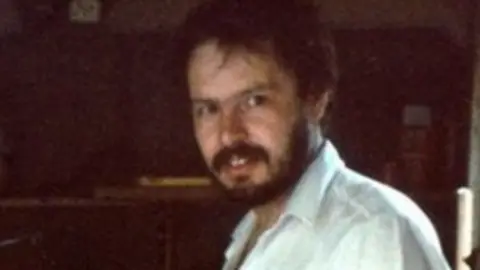Daniel Morgan murder: Government criticises Met Police repeat mistakes
 PA Media
PA MediaMistakes by the Metropolitan Police during the investigation into a private detective's murder have been repeated by the force since his death, a report says.
Daniel Morgan was killed with an axe in a London car park in 1987.
The trial of four men charged with the Welshman's murder collapsed in 2011.
A UK government report said failings relating to handling of evidence and informants and "corruption" hindered investigations at the time.
It added that mistakes included insufficient protection of the crime scene, lack of clear roles for officers, and conflicts of interest for those involved which "continued through each subsequent investigation".
An independent panel last year accused the Met of "institutional corruption" over the unsolved murder.
It did not find any evidence of police involvement in Daniel Morgan's death, nor did it find any evidence that he was murdered to cover-up police corruption.
But it said the force had "a culture of defensiveness with a focus on preserving its own public image".
The government's new report in response to the findings says the force "compounded the suffering and trauma" of the victim's family.
It added: "Some of the issues borne out in the panel's report should have been learned over the 36 years since Daniel's murder, but these have been disregarded and thus mistakes were repeated.
"The MPS [Met Police] and policing need to continue to improve as learning organisations."
Daniel Morgan's family believe he was on the verge of exposing police corruption when he was murdered.
The body of Mr Morgan, originally from Llanfrechfa, near Cwmbran, Torfaen, was found in Sydenham, south-east London.
On Thursday, home secretary Suella Braverman said the panel made 23 recommendations "as a consequence of the failings of process and accountability it identified" and, while most of the recommendations were for policing, several also required government attention.
The recommendations include ensuring the "management arrangements" in place at the time of the investigation "can never be replicated", that the senior investigation officer is never also the family liaison officer, and that adequate resources are directed to tackling corruption within the force.
'Damage done to public trust'
"It is clear from the independent report that serious failings occurred over a period of three decades that run counter to the British tradition of policing by consent and the code of ethics this government introduced in policing in 2014," she said.
"I expect chief constables to do all they can to ensure recommendations are delivered upon, that similar failings do not reoccur, and that the damage done to public trust is repaired."
The government report added that the case will have a "lasting impact on policing as a whole".
